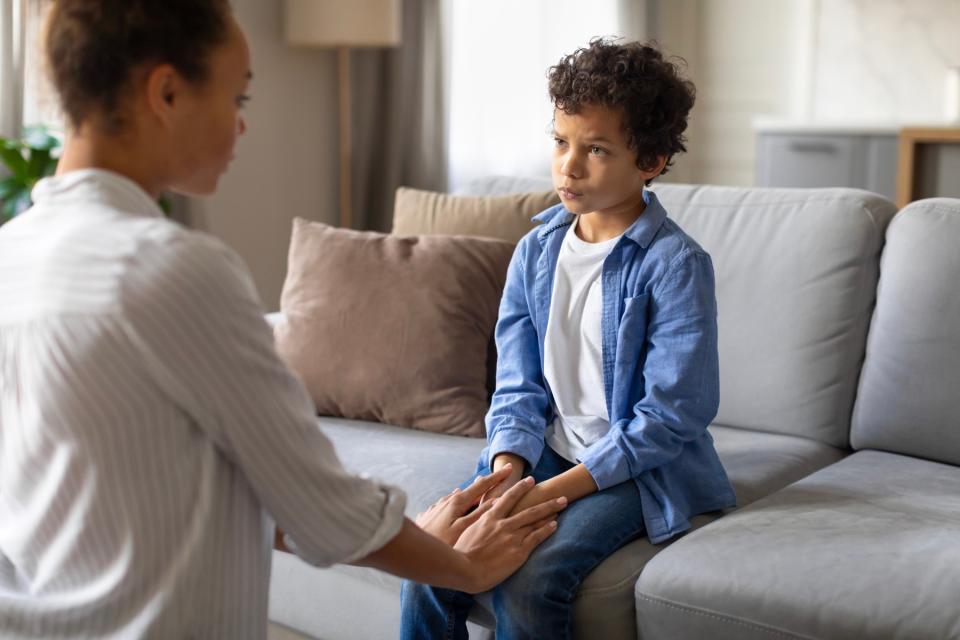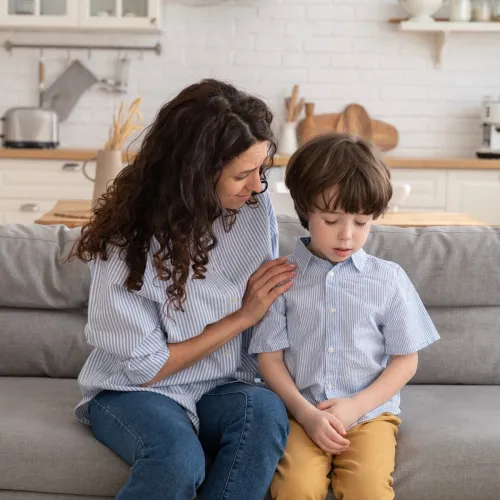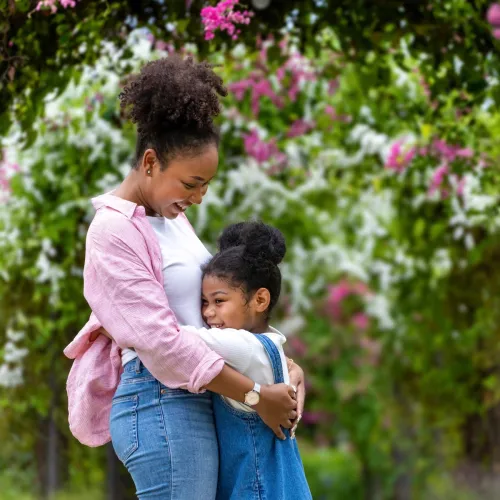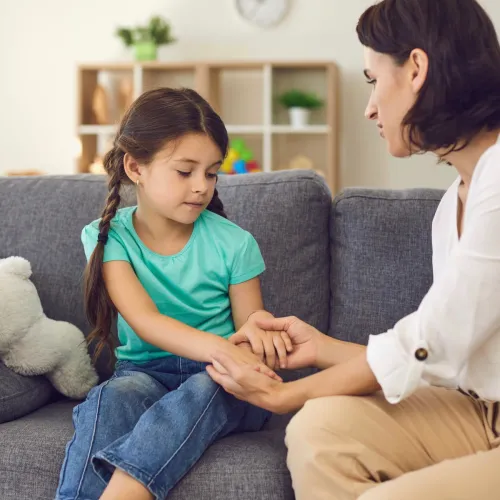How to Tell Kids About Divorce
Telling your child that you’re getting a divorce is a huge task—it might be scary to even consider it. But your child needs to know (and they need to find out from you). Through my 46 years as a family psychologist, I’ve learned what methods work well and which ones make it harder for the kids. This article covers the crucial do’s and don’ts for breaking the news to your child or children.
Inside this article:
Do’s: How to break the news to your kids
Tell your kids about the divorce.
This sounds so silly, but it's really important for parents to tell their kids. To do it in a planned-out, thoughtful, and caring way. Parents have a tendency to put it off because it's—understandably—a really hard and unpleasant task.
But one of the worst things is when kids overhear a conversation, or see a text come up on a parent's phone, or have a friend say something to them because Mom or Dad is friends with that kid's parents.
If you wait too long, I think children feel a sense of betrayal. Kids don't understand why their parents didn't trust them with the information.
Another problem is that waiting too long models poor coping skills. We want to teach kids active coping skills, and that means doing things that are hard. We don't want to teach children that we just put off the hard things.
You don’t have to wait until you have everything figured out—not even the schedule. You can instill confidence in your kids by saying, “Your Mom/Dad and I are working on this. And we have people who are helping us” (if that's true).
Kids don't expect to know everything all at once. In fact, they can't take it all in. It's an adult need to have it “all figured out.” It's not a child need.
What if one parent doesn’t want to tell your child about the divorce?
What if one parent wants to tell the kids now, and the other parent says, “No, not yet”?
Well, we don't get to control each other's behavior. That's a rule of divorce. I think it's important to listen to the parent’s reasons and see if there's some possible flexibility. But you don't want to just keep putting it off until they're “ready.”
Tell them together.
It's best if you and your co-parent can break the news to the kids together. That way the kids don’t feel the conflict as intensely, because they still see you working together.
What if you can’t be in the same room as your co-parent?
First, inform the other parent when you’re going to talk to the kids. Go ahead and tell them, and it's important to let them know that the other parent knows about the conversation.
I wouldn't want a parent to feel guilty because it's not comfortable or safe to be in the same room, as long as they do a good job of being there for their child.
What if you’re the second parent to bring it up, because your co-parent already told them?
This is hard, because often the second parent is the one who doesn't want the divorce.
I ask those parents to start with, “I'm guessing you have questions about…” Or, “I know Mom or Dad talked to you about the divorce last weekend/week. I'm guessing you have questions. Are you wondering whether we’re going to be able to take our camping trip this summer?” (Rather than just saying, “Come to me if you have any questions.”)
It's a lot easier if the second parent brings up the conversation. If the child has to bear the responsibility of telling the parent that they know, that's a developmental burden.
Write a script for the conversation.
I recommend that parents actually write a script. You don't have to read it verbatim—but you have to have a script that you agree on.
It could be simply a list bullet points of what you want to say. It doesn't have to be a one-act play. But with a script, you can handle the conversation the way you planned to, rather than getting caught up in the emotions of the moment and drifting in a direction you didn’t want to go.
Tell your kids it’s ok to tell other people about the divorce.
You don't want to burden your child with a secret. So make it clear that it's okay to tell. It’s also very helpful to mention specific people who already know: “Well, Nana and Papa know. Auntie Sue and Uncle Rich know. I don't know if they have told Nathan and Carly yet, but it's okay for you to tell them!” That makes it easier for the kids to talk to people about what’s going on in their life.
Your children will need to get support from peers, school personnel, coaches, friends’ parents, and extended family members.

Address your child’s feelings directly.
Some children readily share their feelings, but lots of children don't. Some children are concerned about sharing their feelings because they think they're going to burden their parent, who is probably already sad and stressed.
So addressing their emotions directly is really helpful. Don’t passively wait for your child to come to you with their emotions.
Start by reflecting to the child what you see. Say you're at dinner, and your child has tears in their eyes. It's okay to say, “You seem sad tonight. What's going on?” Or at bedtime, when the child is usually chatty about their day but tonight they're not, say, “You're awfully quiet tonight. Are you thinking about the divorce?”
Here are a few signs that your child needs to talk about their feelings:
- Tearing up
- Wanting to be in their room more than usual
- Not wanting to talk about their day anymore
- Being quick to anger
- Being unusually unkind to their siblings
It might turn out that there's something else going on in the child's life, and they haven't yet found the words to tell you. But it might be about the divorce.
You can address their feelings right in the moment. Or you could bring it up in the car, when you have a captive audience. Or it could be at bedtime, especially if the siblings aren't around then, and you two really have private time.
How can you comfort your child when they are sharing their difficult emotions?
- Holding
- Hugging
- Back rubbing
- An arm around the shoulder
- Sitting quietly with them, and just letting them have their feelings
- Take some deep breaths together, especially if they're crying really hard
Help your child calm themselves down—not by trying to eliminate their feelings, but by validating them and helping your child manage them.
Arrange for you to talk to a good friend right after the conversation.
Before you break the news, set up a time to talk to someone you trust right after the divorce conversation. Somebody who will provide care and support to you—a sibling, a parent, a friend, someone from your religious affiliation.
You’re going to need support. Breaking the news can be a very emotional experience for the parents. If you know you’ll get to vent shortly after wrapping up the conversation, that can help you hold back the things you don’t want to share with your kids.
Schedule a follow-up meeting.
Kids can't download all the information at once, in one meeting. So I tell parents to consider a follow-up meeting two, three, or four weeks out. “Hey, how are you feeling about the divorce? Let's talk about how it's going.”
In that first conversation, keep the dialogue simple.
If you and your co-parent have worked out a schedule, and you know it's going to be an equal time-sharing schedule, or one parent has a unique work schedule, you can say, “You'll be with Mom or Dad when they're not at work, and you'll be with me when they are at work.” Stick to the basics. In other words, it might be overwhelming if you tell them what you’re going to do for all the upcoming holidays. Save that for the follow-up.
You can use these follow-up conversations to evaluate how your child is handling the divorce. “How are you feeling about the divorce? What's working and what's not working? What do your Mom or your Dad and I need to work on for you?”
You might find out that your child is ok with the divorce, but not ok with schlepping their belongings back and forth. So you could set up a system where, for example, you leave the sports gear on the porch, and the other parent picks it up—or they come to the field and they hand it off. Then the child doesn’t need to worry about it. You can also try problem-solving together to model how we handle challenges.
If you have more than one child, expect that they might have very different answers to your questions.
Reassure your child that your love for them will never change.
It's really important to reassure your kids that you love them. Divorce can be confusing to children and teens, and they might question whether love is permanent. So clarify that a mother’s love or a father’s love is forever.
Kids will often follow up by asking, “Well, do you still love each other?” It's important to be honest there. “No, that's why we're getting a divorce.” Or, “Yes, but not in the way people love each other when they stay married.”
Sometimes parents say, “Well, there's all kinds of love—for example, you love our dog, and you love me, and you love your daycare provider, but it’s not the same.”
Love between grownups can change. But your love for your child can never change.
Don’ts: How not to break the news to your kids
Don’t tell your children the day before a holiday.
You don't want their memory of finding out about the divorce to forever ruin a special day. So don’t break the news the day before a major holiday, or the day before their birthday.
For many kids it works best to tell them on a Saturday morning. Then they have the rest of the weekend to process it.
Don’t assume you know how your child feels.
It's really important for parents to let their child have the feelings they have—not the ones you’re expecting them to have.
Some kids are primarily sad. Some are primarily mad. Some kids are relieved! And some kids have all mixed up feelings that they can't identify. Some kids are surprised when they hear about the divorce, and some kids have been expecting it for a long time.
And within a family, if there's more than one child, it's very common for the children to have different feelings.
Sometimes kids get mad and say, “This is your fault!” The tip that I always give parents is not to be defensive, not to try to explain. Instead, say something caring like, “I know this is really really hard.”
I also think it's important for parents to say things like, “There's a lot of grown-up stuff that we don't need to talk about.”
Don’t say negative things about your co-parent—or let extended family members say negative things.
Sometimes, family members think they're supporting you by being negative about the other parent. But we know that divorce puts the child at risk for both physical and mental health problems, and talking negatively about the other parent only makes it worse.
Some kids start developing psychosomatic problems. Headaches and tummy aches are the most common ones, or even a generic, “I don't feel good. I don't want to go to school.” We also know that talking negatively about the other parent—whether it’s coming from you or your family—increases your child’s feelings of anxiety and depression.
Kids easily feel overwhelmed by divorce. It can feel hopeless and helpless to have your parents at war. So it's really important to tell your extended family members how they should talk about the divorce with your child (i.e., by saying nothing negative about the other parent).
I did therapy with a little boy who was 5 years old at the time of the divorce. He had very big feelings. He and his mom worked really hard at helping him with his big feelings, and the therapy was successful.
Ten years later, I heard from Mom. She wanted to come back in. She was about to remarry, and the child’s big feelings had all returned.
So they come to my office, and now this boy is taller than me, at 15 years old. He says to her, “Why did you and dad get divorced?” And she said, “Well, you know, we grew apart—" and he interrupted her, saying, “I don't want that baby explanation. I want to know what really happened.” That curiosity is totally developmentally appropriate. But answering the question probably isn’t.
Mom responded like this: “I have never spoken a bad word about your father, and I will not start now.”
He was totally reassured, and the big feelings were able to be resolved. That's what we call taking the high road.
Of course, it’s very normal to have negative feelings about your co-parent. But there are healthy ways to rant about your co-parent—and the most important part is keeping your kids out of it.
Don’t say, “Do you have any questions?”
This may be surprising, but I recommend not saying, “Do you have any questions?” What that does is make it a big hill to climb for the kids, who probably feel overwhelmed by how many questions they have.
So ask something specific. For example, “Do you have any questions about where we're going to live? Do you have any questions about when you're going to see Grandma Mimi? Or whether we’re going to be with Auntie Ann this Christmas to bake cookies?” It gives the child an opening. They may even say “no” to your suggested question, but then share what questions they do have.
Common questions include:
- When will I see each of you?
- Where am I going to live?
- Will I get to see my friends?
- Will I get to stay in my activities?
- What's going to happen with holidays?
Older kids and teenagers often care about money, too.
- Will I still be able to go to college?
- Are we going to have to sell the house?
- Will I have to change schools?
- Will I still be able to get a car?
Don’t tell them too much—but don’t lie, either.
How do you respond when the kids inevitably ask, “Why are you getting a divorce?” First, it's important not to tell them adult information, which can result in parentification (i.e., burdening a child with grown-up information, emotions, or responsibilities).
But it's also really important not to lie, because kids can smell it at a hundred yards. Whatever you say has to be true. Some parents say, “Well, you've seen us arguing a lot lately. We’re just not getting along. And so it's better for us not to live in the same house.” That’s appropriate to share.
But it's not okay to say, “Your Mom or Dad is sleeping with another man or woman, and they don't love me anymore.” In many situations, telling your child about your co-parent’s negative behaviors can hurt your child—especially if they don’t already know about it.
If it’s something the kids are already aware of, it is okay to be honest. If your child asks, “Is this because of Mom’s or Dad's drinking?” It is okay to say, “That's one of the problems we have.” You don’t want to tell kids they're imagining things. But it’s safe to say there are lots of reasons why Moms and Dads get divorced. It's never just one reason.
It's important not to get into defending yourself with a child, or blaming the other parent, or, even worse, arguing with the child.
It also doesn't work to tell the child, “I'm telling you the truth,” because that implies that the other parent isn't, and then they're caught in between their two parents, which is inappropriate and painful.
Don’t say, “I’ll tell you when you’re older.”
If there has been infidelity, it’s not wise to tell your children—even once they're adults. It’s healthy for your child to have strong relationships with both you and their other parent, even once they’re adults.
Although it's different if a child sees something. These days, kids are looking at their parents’ phones. They might see a flirty text from somebody. They're going to have questions about that, and the other parent should only direct them back to the parent who received the flirty text.
Mom shouldn't be answering questions about Dad, and Dad shouldn't be answering questions about Mom. But it’s good to reassure the child and say, “That's a really important question. You can ask Mom.”
Don’t overpromise.
Only promise what you can control. For example, say there was going to be a big family vacation in the summer. So your kids might ask, “Are we still going to go to Yellowstone?” You might not know how that's going to work now that you and your partner are not together. You might be uncertain whether you can afford it, given all the additional expenses of having two homes.
Instead of overpromising to comfort your children in the moment, say, “I don't know, but we’ll figure it out. I will let you know as soon as possible.”
Don’t use the word divorce with little kids.
With little kids, it's not even necessary to use the word divorce. Just say, “Mom and I, or Dad and I, are going to have two houses now. You're going to spend time living with each of us.” Divorce is a word that doesn't mean anything to preschoolers.
What about later on, after the conversation?
For most of these topics, you're not going to say them once. With some of them, you're going to say them 50 times. Kids need reassurance and loving support—because divorce is a process, not an event.
If you and your partner are clearly in conflict, your child will likely show signs of stress. And that stress can continue even after the conflict gets resolved, because the feelings don't magically go away. The confusion, the sadness, and the anger don't automatically get resolved when Mom and Dad figure out the holiday schedule.
Here are three of my biggest pieces of practical advice for making the divorce easier on the kids:
1. Put up a custody calendar.
As soon as you’ve agreed on a schedule, put a calendar up identifying Mom days and/or Dad days, or parent days and grandparent days—whatever your family and custody situation look like. Identifying in colors where the children are each day of the week, so they can look and see, “It's a blue day. Dad will pick me up after gymnastics.”
2. Watch for anniversary reactions.
An anniversary reaction often happens a year after your children were told about the divorce. Some kids get into a tailspin. If their parents got divorced last year in spring, and now the flowers are budding and the trees are leafing out, they might experience a flood of sadness, because it reminds them of what used to be.
The first anniversaries are the toughest—the first Christmas after the separation, the first child's birthday after the separation. Those might be times of increased sensitivity and difficulty.
3. Try to keep a consistent routine.
As far as possible, simplify your kids’ lives by keeping the same routine in both houses. The same bedtimes, mealtimes, extracurricular schedules, etc. It can be difficult to coordinate with your co-parent, but living in two homes that run very differently can be a huge challenge for children.
How to tell your kids you’re getting divorced: Plan it out, tell them carefully, and support them as they process the news.
This may be one of the most difficult conversations you’ll ever have, but you don’t have to do it perfectly. Parents aren’t perfect! If you keep your child’s best interests in mind, that can guide you as you navigate this tricky discussion.




